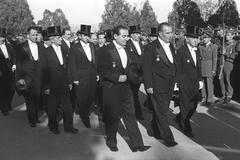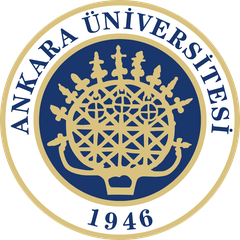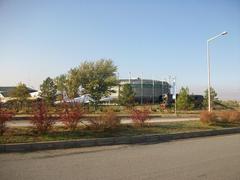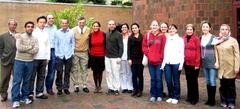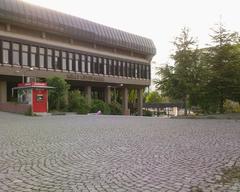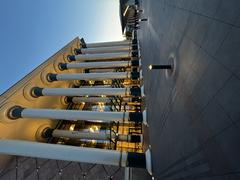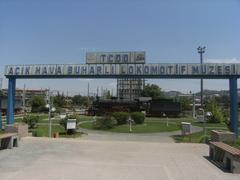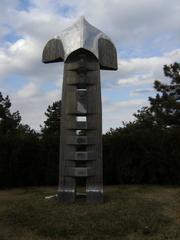Ankara University Observatory: Visiting Hours, Tickets, and Educational Impact
Date: 04/07/2025
Introduction
The Ankara University Observatory—officially the Ankara University Kreiken Observatory (AUKR)—is a cornerstone of Turkey’s astronomical research and public science education. Founded in the mid-20th century under Dutch astronomer Prof. Dr. Egbert Adriaan Kreiken, the observatory has evolved into a hub for both advanced research and vibrant community outreach. Located in the low-light-pollution Ahlatlıbel district, about 18 kilometers south of Ankara, the observatory offers an ideal setting for celestial observations and a unique experience for visitors of all backgrounds (Ankara University Observatory).
Table of Contents
- Introduction
- Historical Development and Significance
- Visiting Information
- Research and Academic Contributions
- Public Outreach and Educational Programs
- Visitor Tips and FAQs
- Visual Media and Online Resources
- Conclusion and Call to Action
- References
Historical Development and Significance
Origins and Growth
Established in 1954, the Ankara University Observatory marked a milestone in Turkey’s scientific modernization. Prof. Dr. Egbert Adriaan Kreiken, a visionary Dutch astronomer, led its founding and helped shift Turkish astronomy from theoretical pursuits to practical, research-driven science. The observatory was carefully sited for optimal viewing, offering nearly 300 clear nights annually and minimal light pollution.
Institutional Integration and Modernization
Over the decades, the observatory became integral to Ankara University’s Department of Astronomy and Space Sciences. Expanded research facilities, new telescopes, and a focus on both photometric and spectroscopic studies bolstered its academic reputation. Modern upgrades include the T80 80 cm telescope, installed in 2019, enabling cutting-edge work in exoplanet detection and stellar spectroscopy (Wikipedia).
National and International Impact
AUKR collaborates with institutions like TÜBİTAK National Observatory and Kandilli Observatory, and participates in global studies on variable stars, exoplanets, and solar phenomena. Its research is regularly published in international journals, and its legacy includes significant contributions to the selection of sites for major Turkish observatories (IAU Astronomy in Turkey).
Visiting Information
Hours and Tickets
- Opening Hours:
- Tuesday to Saturday: 9:00 AM – 5:00 PM
- Closed Sundays and Mondays
- Public Observation Nights:
- Held monthly or during significant astronomical events, primarily on weekends. Hours typically begin at dusk and extend several hours into the night.
- Check the official events calendar for up-to-date schedules.
- Tickets:
- Adults: 20 TRY
- Students/Seniors: 10 TRY
- Children under 12: Free
- For special events (e.g., eclipses, meteor showers): 100 TL for adults, 50 TL for students.
Admission is free for general visits during standard hours; event nights may require registration or a ticket fee.
Guided Tours and Events
- Guided Tours:
Available upon request and highly recommended for groups and educational visits. Tours include telescope demonstrations, access to the historical instrument museum, and explanations of current research activities. - Special Events:
Public observation nights and themed activities are scheduled during notable celestial phenomena, such as eclipses or meteor showers. These events feature expert talks, workshops, and interactive sessions (Star Walk Astronomy Calendar 2025).
Accessibility and Directions
- Location:
Situated on the Ankara University campus in Ahlatlıbel, approximately 18 km south of Ankara city center. - Accessibility:
The facility is equipped with wheelchair ramps, accessible restrooms, and staff assistance for visitors with special needs. - Transport and Parking:
Easily reachable by car or public transport; parking is available on-site.
Nearby Attractions
Enhance your trip by visiting cultural sites close to the observatory:
- Atatürk Mausoleum (Anıtkabir)
- Museum of Anatolian Civilizations
- Ankara Castle
- Atatürk Forest Farm and Zoo
Research and Academic Contributions
The Ankara University Observatory is a leading center for astronomical research in Turkey. It houses nine optical telescopes, including advanced instruments for photometry, spectroscopy, and solar observations. Research areas include:
- Variable stars and exoplanet detection
- Solar and lunar phenomena
- Stellar spectroscopy and planetary science
The observatory promotes national and international collaborations, supports undergraduate and graduate training, and regularly publishes in peer-reviewed journals (Ankara University Office of the Dean of Research).
Public Outreach and Educational Programs
AUKR plays a pivotal role in science education and outreach:
- Public Days:
Open events featuring guided tours, night sky observations with large telescopes, and presentations by astronomers. - School and Group Visits:
Tailored programs with hands-on experiments, solar observations, and interactive tours.
School Visits Information - Special Events:
Celebrations of key astronomical phenomena and international science weeks, offering extended activities and themed workshops. - Mobile Astronomy:
Outreach initiatives bring telescopes and educational kits to schools and community centers beyond the observatory.
Educational resources include printed guides, online articles, and public access to scientific research (Ankara University Observatory Website).
Visitor Tips and Frequently Asked Questions (FAQs)
Q: How do I book tickets for the Ankara University Observatory?
A: Standard visits and most public nights do not require advance booking. For group or school visits, use the official website to arrange your trip.
Q: What should I bring?
A: Dress warmly for evening events, wear comfortable shoes, and bring binoculars for enhanced experience. Always check weather and event schedules before visiting.
Q: Are tours available in English?
A: Yes, English-language tours can be arranged for groups by prior request.
Q: Is the facility accessible for people with disabilities?
A: Yes, contact staff beforehand to discuss any specific needs.
Q: Can children participate?
A: Absolutely—many programs are designed for young visitors and families.
Visual Media and Online Resources
- High-quality images and virtual tours are available on the official website.
- Descriptive alt text (e.g., “Ankara University Observatory 300 mm telescope”) enhances accessibility and SEO.
- Explore the observatory’s photo galleries and virtual map to plan your visit.
Conclusion and Call to Action
The Ankara University Observatory uniquely blends historical significance, innovative research, and dynamic public education. Whether you are an astronomy enthusiast, a student, or a curious traveler, a visit promises hands-on learning and a deeper appreciation of Turkey’s scientific heritage.
Plan your visit today by consulting the official Ankara University Observatory website, download the Audiala app for updates, and follow the observatory on social media for news and event announcements.
